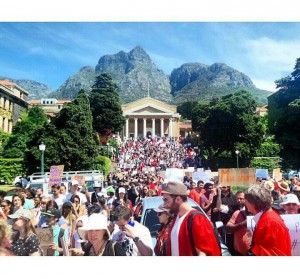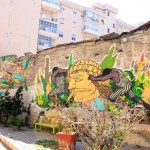Approximately 50% of South African children who enroll in grade 1 do not make it to grade 12 and only 12% qualify for university. The ’Fees Must Fall’ campaign constitutes a bigger issue than just tuition fees. The real concern is the lack of equal opportunities among South Africa´s population. While higher education is not for everyone, equal access to it should be. Merit rather than money should constitute the key to ones future.
In July 1993 Nelson Mandela addressed South Africa´s Trade Union Congress stating that: “If the ANC does to you what the apartheid government did to you, then you must do to the ANC what you did to the apartheid government.”

The latest weeks of uprisings illustrate many students’ clear and unified discontent with the ANC government, and Mandela´s message might just as well have been addressed towards them. The planned increase of tuition fees at universities has obviously proven to be the straw that broke the camel’s back. Hence, it is legitimate to pose the question if the current unrest is an analogy of the classic Orwellian story, where the liberator has become the villain.
Margaret Thatcher and Ronald Reagan, among many, branded the ANC as a terrorist organization, undermining a rightful opposition towards a racist and oppressive regime. However, the condemnation today does not come from right wing Western world leaders, but from the subjects the ANC once fought to protect: the underprivileged non-white South African population. While one must remember and respect the ANC for its pivotal contribution to democracy in South Africa, one must also realize that past actions do not even up for being put on a pedestal forever. After all, in a democracy, legitimacy for political power correlates with the capability to acknowledge the needs of the people you represent. Regarding an equal opportunity to higher education, the ANC has failed its subjects. The current unrest is not simply about unreasonable tuition fees. The real issue is the lack of equal access to continuous and long-term higher education among the South African population. Black South Africans are still underrepresented within academia even though they constitute 80% of the population. The structural oppression lives on even though the ANC has had political power for 21 years.
Article 26 in the United Nation´s Universal Declaration of Human Rights does not state that higher education necessarily shall be free but that it “shall be equally accessible on the basis of merit”. The tuition fees in themselves therefore have become the cause for unequal access to higher education. Free tertiary education is not an unrealistic or utopian demand and it does not only exist in European countries like Germany, Norway, and Sweden. In both Russia and Brazil, South Africa´s fellow BRICS partners, free university education is a possibility. Even so, structural segregation determines who will be able to attend universities without paying tuition. The Atlantic´s article “Brazil: Where Free Universities Largely Serve the Wealthy” from April this year, clearly illustrates this problem.
The South African student protests of 2015 should be seen as an opportunity for the whole country. South Africa could take a leading role among the BRICS countries, illustrating that equality should be a priority, not only among countries, which is the ground on which BRICS was founded in the first place, but also among people within the member countries of BRICS.

Photograph by: Renata Bossi
From a budget perspective this would be feasible and the South African government is aware of this. In 2012 Higher Education and Training Minister Blade Nzimande received a report from an expert group, set up by the government, concluding that introducing free university education for the poor is realistic from a financial perspective. Therefore free tertiary education is not by definition just for countries like Germany, Norway, and Sweden. If South Africa would introduce free tertiary education, it could be a benchmark towards which other BRICS countries could be pushed to compare themselves to. With approximately 40% of the world´s university students, the BRICS countries could definitely be a major force for global change regarding tuition fees for higher education. As a member of BRICS, South Africa has the opportunity to be the country initializing this process.
However, South African´s should not limit themselves to focus only on higher education, because access to higher education in itself is preordained by money rather than merit. Further attention needs to be addressed towards the general issue of deficiency regarding the implementation of the right to education on all levels. In a report from 2013, Nicholas Spaull from the Centre for Development and Enterprise argues “that there is an on-going crisis in South African education, and that the current system is failing the majority of South Africa´s youth”. Spaull further argues that South Africa has the worst education system of all middle income countries. 50% of the students that enroll in grade 1 will not make it to grade 12 and only 12% will qualify for university.
Striving for free university education is a noble cause that needs to continue, but the 88% that never qualify for university needs to be included in the struggle. Higher education is not for everyone but the equal opportunity should be and merit rather than money should constitute the key to ones future.


